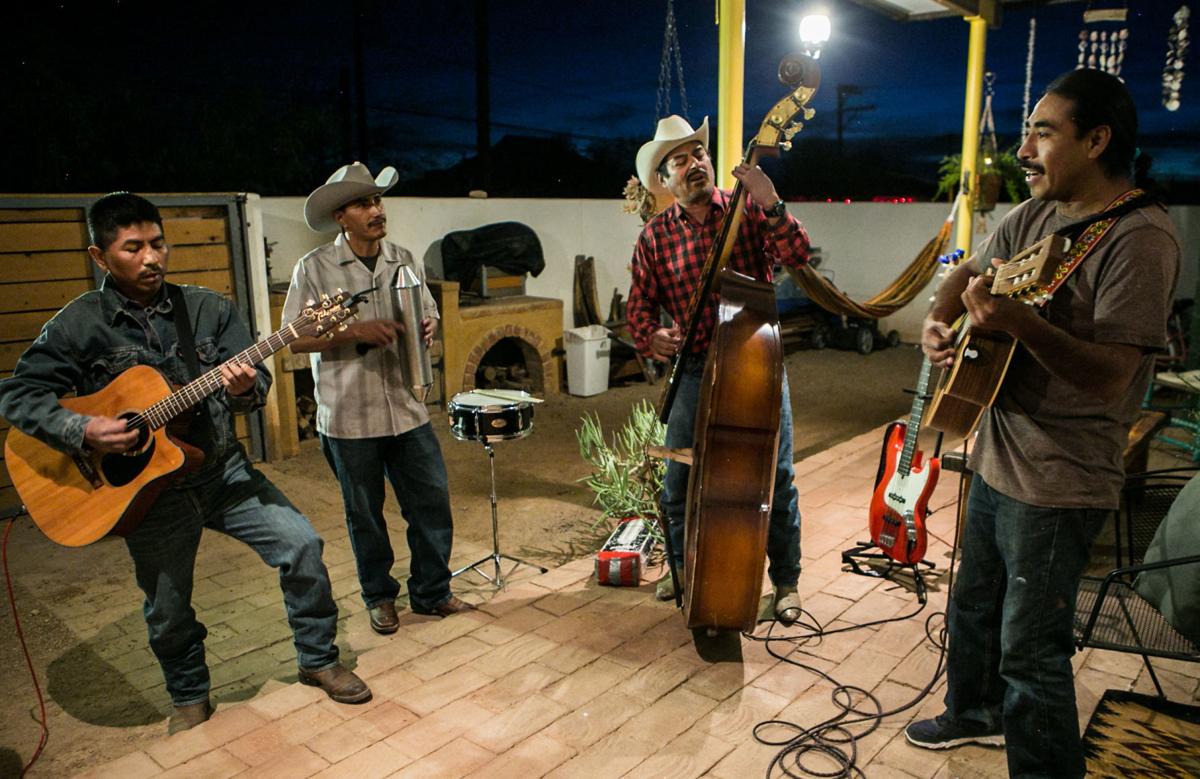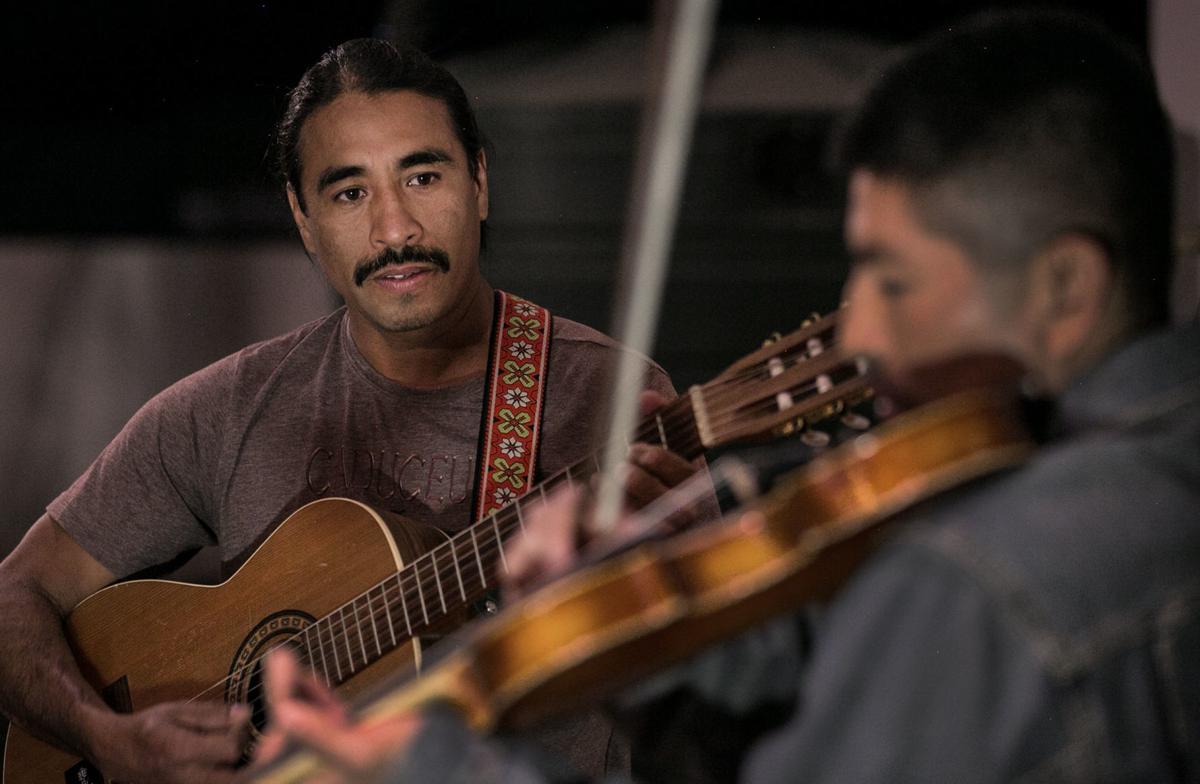Neto's Tucson: Los Liricos sing of hope

Tucson’s musical heritage is strongly influenced by immigrants. Here, members of Pedro y Los Liricos practice on a porch on South Rubio Avenue. From left are Pablo Hernandez, Raymundo Chavez, Pedro Rios and Gerardo Ruiz Lopez.
Photos by Ron Medvescek / Arizona Daily StarThe sun was setting behind “A” Mountain and from the porch of a Barrio Santa Rosa home the festive sounds of guitars, upright bass and snare drum wafted over the wall and dispersed into the twilight.
Pedro y Los Liricos were rehearsing for an upcoming gig, going over songs that the quartet planned to perform in a few days at a downtown hipster coffee shop. They were upbeat, engaged in norteño, cumbia and ranchero music that is more commonly heard in the barrios south of downtown.
The group is one of many conjuntos that are born in Tucson’s immigrant neighborhoods, keeping alive the music of the Mexican diaspora. They share their ancestral rhythms and their common culture. Throughout Tucson’s history, immigrants have shared musical bonds, like Tucson pioneer Federico José María Ronstadt, a Sonoran-born immigrant who in the early 20th century led the Club Filarmónica Tucsonense with weekly performances. His legacy lives on in his descendants and in newly formed groups like Pedro y Los Liricos.

Gerardo Ruiz Lopez watches Pablo Hernandez play violin during a rehearsal. “When we see people smile, we know the music brings out what we have inside,” said Hernandez.
Ron Medvescek / Arizona Daily StarThis group was born less than two years ago a few blocks away from where its musicians were rehearsing last Tuesday.
The four first came together in the parking lot of Southside Presbyterian Church, at South 10th Avenue and West 23rd Street, where day laborers gather every morning waiting for a job in landscaping, construction or whatever is available.
They got to talking. One thing led to another. Pedro Rios said he played bass. Gerardo Ruiz Lopez shared that he played guitar. Pablo Hernandez revealed that he played the requinto, a smaller, high-pitched guitar, as well as the violin and accordion. And Raymundo could tap out beats on a drum, he told his fellow jornaleros.
“Everyone had their style and we did not quite get into sync right away,” Ruiz Lopez said.
However, within a few short months the group made its debut performance at Most Holy Trinity Catholic Church on Tucson’s west side to celebrate the Southside Worker Center’s 10th anniversary. A few more performances followed, and last year Los Liricos took the stage at the annual Tucson Meet Yourself festival. And late last year they began monthly shows at Exo Roast Co., 403 N. Sixth Ave.
“And now we are here,” said Rios, a native of the state of Jalisco and the elder of the group, who played in bands while working in California.
They are self-taught musicians. They don’t read music. They learn the music by listening to the songs.
“We had to give it time,” said Chavez, 45, the percussionist.
What started out as a hobby to pass away the little free time they had has turned into a more serious endeavor. They did it for the love of the music. Buoyed by the reception they have received, Los Liricos have gained confidence. Their repertoire is at least 100 songs and growing.
“Yes, we can do this,” Ruiz Lopez said, echoing the group’s conviction.
While the quartet finds satisfaction in playing before audiences, sharing the joy of their music, and the beauty and depth of their community’s culture, underneath lie worrisome sentiments. The feelings are not noticeable to the enraptured couples on the dance floor or listeners at a table who are merrily tapping their toes.
Los Liricos are proud immigrants, working in our neighborhoods and contributing to our well-being. Yet they know that as individuals and as a group they are increasingly unwanted and seen as a threat. During their rehearsal while they optimistically talked about their songs, President Trump was giving his State of the Union address in which, again, he pressed his nationalistic agenda. It is an unwelcoming agenda which blames and disparages immigrants like Los Liricos.
Not all of Los Liricos are U.S. citizens or legal residents. One has family in Mexico. Another band member is father to a U.S.-born child and father to a “dreamer,” an immigrant with temporary protection against deportation and whose future has become a political game. The band knows the score but is unsure how this will end.
“I don’t know what’s going to happen,” said Ruiz Lopez, who was born in Chiapas, in southeastern Mexico, and who faces a deportation order.
They do know that living and working in uncertainty is difficult. They keep their fears to themselves while they perform their bouncy tacatacas. They believe their music brings happiness to their audience, some of whom may be experiencing similar legal and personal obstacles in their lives.

Members of Pedro y Los Liricos got to know each other at Southside Presbyterian Church, where day laborers wait each morning for jobs. In less than two years, their repertoire has grown to more than 100 songs.
Ron Medvescek / Arizona Daily Star“When we see people smile, we know the music brings out what we have inside,” said Hernandez.
Los Liricos are generally apolitical in their music, but they are writing songs like the “Corrido de Juanito,” a ballad about the daily trepidation faced by undocumented workers in the United States. It’s real.
More than once while they’ve been working on landscaping jobs in the gated Foothills barrios, sheriff’s deputies have been called to investigate “suspicious” individuals, said Ruiz Lopez, 40, who is married to a U.S. citizen. “We clean their homes and their yards but they don’t want us,” he added.
They also could write a song about 46-year-old Hernandez, the multi-instrumentalist, and the day his mother passed away in his native Veracruz. Immigration laws prevented him from traveling to his hometown to bury his mother.
Despite the daily worries and hardships for Los Liricos and the community that they reflect, it is the music that bolsters their kindred spirits. They find purpose and unity in their songs and performances.
“We represent those people who are fearful,” said Ruiz Lopez. “And through our experience and music, we show our union, our strength.”
They are living their songs.
Ernesto Portillo Jr. is editor of La Estrella de Tucsón. He can be reached at 573-4187 or netopjr@tucson.com. On Twitter: @netopjr

